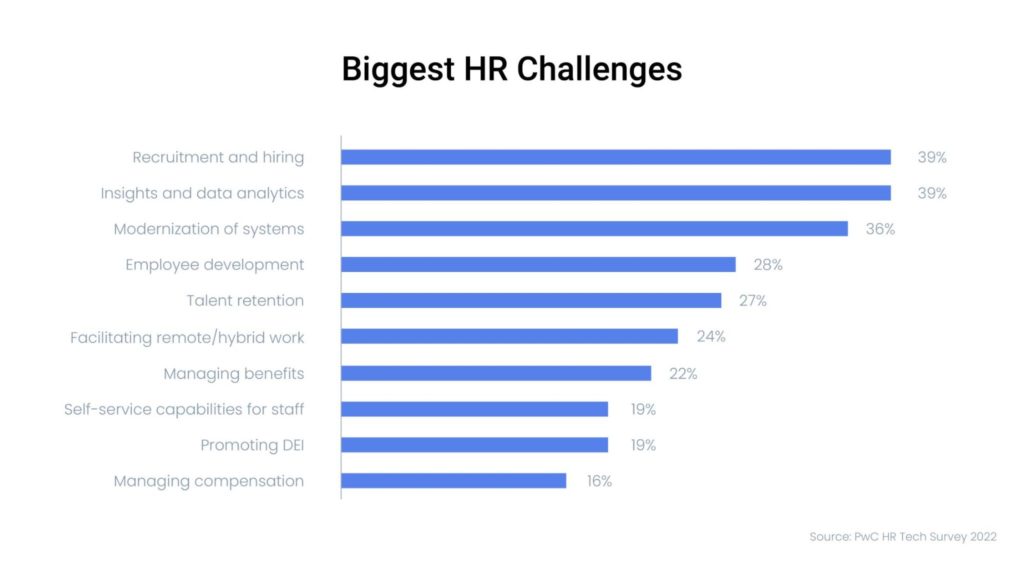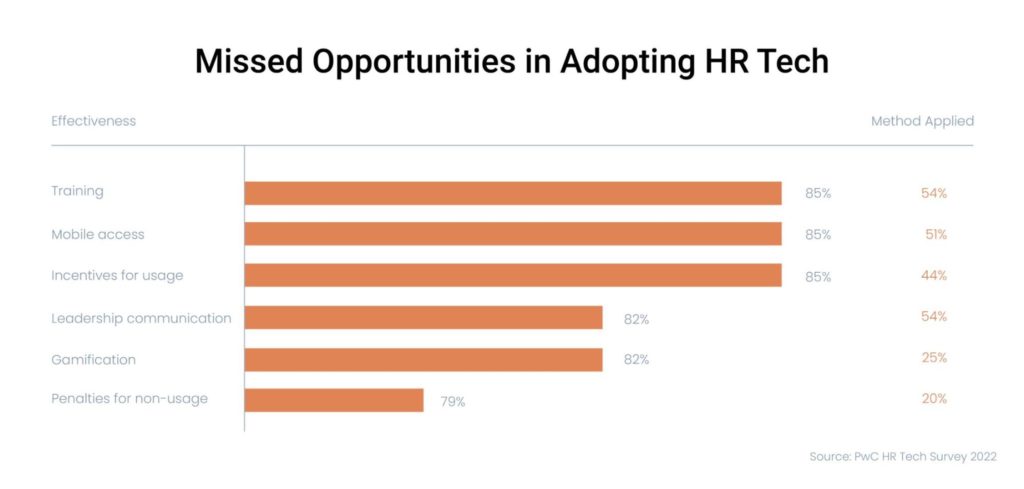Today, technology is indispensable for HR teams. The right HR tools allow remote, on-site, and hybrid teams to flourish. In fact, HR tech solutions have dramatically improved productivity, engagement, and compliance.
HR has led the way into the future for countless companies. Forward-thinking HR managers have guided leaders in taking big leaps with disruptive technologies. And some of these technologies are quickly becoming normalized—or will within the next few years.
At the same time, 92% of managers don’t believe their company is prepared for the future. It’s time to change that.
We’re about to take a deep dive into the most groundbreaking HR technologies. The insights we share will help you determine the right HR tech for your organization’s needs. Plus, they’ll help you make the business case for these technologies to your company leadership.
Navigation
1. What Is HR Tech and How Is It Used
2. The Biggest Challenges HR Tech Solutions Can Solve
4. Challenges in Adopting HR Tech
5. How to Choose the Right HR Tech for Your Business
What Is HR Tech and How Is It Used

The global HR tech market is booming. Fortune Business Insights predicts it will rise to $36 billion USD by 2028. Clearly, today’s emerging HR technologies will soon become normalized.
But what exactly are these technologies? Let’s take a look at what different HR solutions can do for organizations.
HR tech can enhance numerous HR functions. Here are some of the main purposes of these solutions:
- Performance management
- Employee experience
- Recruitment and retention
- Team member collaboration
- Benefits and payroll management
- Compliance tracking
360 feedback software, employee feedback tools, and goal-tracking software are crucial to performance management, for instance. And survey software makes tracking employee experience simple.
How can employers and employees benefit from using this HR tech? HR tech solutions enhance organizations in numerous ways. Let’s examine several of the main benefits.
Increased Efficiency of HR Staff
HR tech solutions can significantly boost human resources productivity. Through automation of tedious and mundane tasks, staff use their time more effectively. They can focus on personal development rather than lower-level tasks.
For instance, survey software makes administering an engagement survey and interpreting results simple. HR can then focus on how to respond to the results. Leveraging survey insights, they can channel their energy into improving the employee experience.
Centralized Access to HR Tools
Software can offer an HR dashboard that puts vital HR functions in one centralized place. HR staff can instantly access metrics and charts on a variety of key topics, like these:
- Engagement
- Team progress toward goals
- Individual employees’ progress toward OKRs
- Workforce diversity
- Benefits utilization
In such ways, HR tech can boost human resources decision-making. Staff have convenient access to the best possible insights.
Enhanced Data Security
Additionally, using a cloud-based system can improve data security. It stores information in a secure, centralized place.
Personalized Employee Support
Of course, employees benefit through performance management support. Such software helps them track progress toward objectives and key results. Their managers also gain clarity on their individual needs and can offer tailored solutions.
Increased Employeee Productivity
Employees become more effective in hybrid and remote work through collaborative software. These tools facilitate group work, keeping teams on task. In a recent study, PwC found that HR tech boosts engagement and productivity.
HR tech can provide easy access to benefits as well during onboarding, open enrollment, and beyond.
The Biggest Challenges HR Tech Solutions Can Solve
What problems do HR technologies solve, and how? According to PwC’s report, the biggest HR challenges are as follows. They’re ranked by percentage of respondents who struggle with each issue.

Both gaining and interpreting data pose a challenge. And recruitment has become especially tricky when done remotely. In a job-seeker’s market, it’s especially important to get recruitment and retention right.
Fortunately, modern software solutions can be a game-changer. They make such tasks easier and more effective than ever, as we’ll discuss.
How HR Tech Has Evolved
The shift to remote and hybrid work has brought sweeping challenges to HR tech. Let’s look at several key changes that are addressing today’s biggest challenges.
The Top 5 Emerging HR Tech Trends
Fortune Business Insights found that tools for improving employee experience are dramatically expanding the HR tech market. The following HR tech solutions do just that. Let’s look at these emerging trends in detail.
Remote management solutions
Today’s employers often want to use technologies to track productivity remotely. They’re looking for innovative ways of doing so. However, going overboard can make employees feel micromanaged. Plus, it can break trust.
“If it gets to the point where employers are monitoring what time did employees log in, what time did they log off, and are they active on their keyboard during the day—those are things that I think erode trust,” says Dan Staley, HR tech leader of PwC, in a SHRM interview.
The solution? Monitor outcomes, not keystrokes. In other words, evaluate the quality of results and progress toward goals. Look at whether collaboration is happening. Software that tracks objectives and key results can help!
The rise of virtual reality and virtual assistants
In a recent report, Gartner advises investing in AR/VR tech for employee training. Augmented and virtual reality technologies will soon gain prominence. They could greatly enhance virtual trainings, for one thing. Such tools can make a company more attractive to new recruits.
Virtual assistants will become quite popular too, Gartner says. Such tools can enhance training modules for all employees, whether on-site or remote!
Tracking and promoting DEI
Performance and salary management software can promote diversity, equity, and inclusion (DEI). Managers can compare whether employees of different demographics have equal support and rewards.
Importantly, emerging tools will allow companies to track neurodiversity demographics. They’ll be able to observe how well they support employees on the autism spectrum or with ADHD. Only 17% of organizations currently tracking diversity track neurodiversity, HR Executive reports.
Flexible benefits programs
Flexible benefits programs are becoming s, especially in the wake of the pandemic. However, they can prove time-consuming to manage. The ability to self-select options takes this burden off HR’s shoulders. At the same time, it provides instant access to perks.
Quality HR tech is crucial for thriving in the post-pandemic world, Gartner asserts. These solutions will make your HR more effective than ever—even at a distance.
Internal talent marketplaces
Job roles are more fluid than ever. In some organizations, roles are becoming more project-based. Project managers might look for talent throughout an organization for new initiatives. So, internal talent marketplaces are on the rise, as Gartner notes.
They allow leaders to “recruit” within their own company. For employees, this can help make work more dynamic and rewarding!
Will HR Tech Replace HR Workers?
No, HR tech is not replacing HR staff. Rather, it provides tools that enable HR staff to work more efficiently. HR staff can focus on talent management rather than tasks like data entry. They can focus on applying insights instead of engaging in tedious data analysis. In short, they can work at a higher level with the help of such tools.
Challenges in Adopting HR Tech
Introducing a new technology can bring some uncertainty and resistance. Respondents to PwC’s survey highlighted effective methods of boosting HR tech adoption. However, responses also signaled that organizations aren’t using these methods often enough.

Use these strategies to boost adoption of new tech, as indicated above:
- Increase incentives that lead staff to use new tech. This could involve publicly recognizing those who set a good example. Or, give a “fun” reward like movie tickets or bowling passes.
- Make sure new tools allow for mobile access. Then, educate staff on how to use them remotely (and via phone, when applicable).
- Provide an introductory training session and follow-up support. Never assume that one training will make staff fully competent in a new technology.
- Hold friendly competitions to see who gets up to speed the quickest. These can be coupled with the incentives mentioned above.
- Make sure leadership understands the value of the technology, uses it, and promotes it to staff.
- Ensure employees understand the consequences of not adopting the new tech. These don’t need to be penalties per se. Rather, explain how the new tech is vital for collaboration and organizational operations.
How to Choose the Right HR Tech for Your Business
Choosing a trustworthy vendor is key, so do your research. Let’s go over the key ways of evaluating an HR solution.
Points to Consider
Read reviews to ensure customers feel satisfied with the product. Make sure the vendor offers ongoing tech support as well. And of course, ensure the software has an intuitive interface. It should be easy for employees and HR managers to pick up and use. Additionally, make sure the software can scale with your organization.
If choosing HR products from different vendors, make sure they synchronize. For example, Primalogik’s performance management software blends seamlessly with BambooHR’s HRIS solutions.
Attending an HR tech conference will give you expert advice on the latest solutions. You’ll have the chance to speak directly with technology users as well. Read on for some of the industry’s top events!
Prominent HR Tech Conferences and Resources

Consider having one or two HR managers from your company attend one of these events. Some take place in person, while others happen virtually.
Human Resource Executive HR Technology Conference
This major conference is happening September 13–16, 2022 in Las Vegas. It will also include the Women in HR Technology Summit. And from February 28 to March 3, 2023, they’ll host a free interactive virtual event!
HR Technology Conference & Exposition
This event will take place completely online from February 28 to March 3, 2023. Participants will get to demo the latest HR software and attend keynotes and informative sessions. They can also chat with product experts.
Health & Benefits Leadership Conference
From May 3 through 5, 2023, this event will take place in Las Vegas. Participants will learn how to use technology to respond to emerging employee benefits needs.
Future Workforce Conference
This virtual event will take place October 12–13, 2022. Panels will discuss how to leverage technology to meet the challenges of today’s HR.
HRcoreLab Summit
This event will be held March 20–21, 2023 in Barcelona. Participants will hear from the world’s leading HR scientists about groundbreaking developments and trends.
HR Transform 2023
From March 27–29, 2023, this event will take place in Las Vegas. It will feature more than 250 speakers on the latest HR technologies.
SHRM22
While this event doesn’t focus solely on HR tech, it will thoroughly cover this topic. Held in New Orleans and virtually from June 12–15, this major expo will discuss all facets of HR best practices.
Introducing leading HR tech solutions can have a dramatic effect on productivity. Plus, it enhances your decision-making ability in regard to recruitment, talent management, and much more. Use this information to show company leadership why HR tech is indispensable for today’s organizations!
Want to learn how Primalogik can transform your HR department? Sign up to demo our product!
